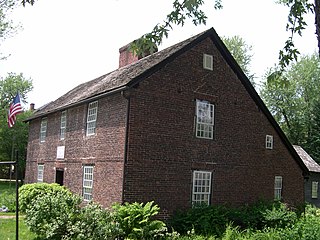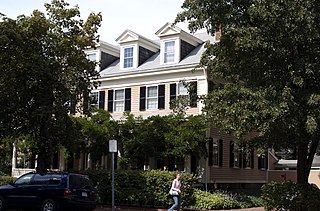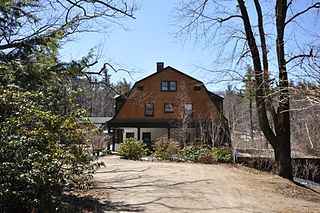
The Josiah Day House is a historic house museum at 70 Park Street in West Springfield, Massachusetts, United States. Built about 1754, it is believed to be the oldest known brick saltbox style house in the United States. It was listed on the National Register of Historic Places in 1975. It is owned by the local historical society, and is occasionally open for guided tours.

The William Morris Davis House is a National Historic Landmark on 17 Francis Avenue in Cambridge, Massachusetts. An architecturally undistinguished Queen Anne-era house, probably built in the 1890s, it is notable as the home of William Morris Davis between 1898 and 1916. Davis (1850-1934) was a professor of geology at Harvard University, and an influential figure in the development of meteorology and geomorphology as scientific disciplines. His textbook Elementary Meteorology was a standard of that field for many years. The house was declared a National Historic Landmark in 1976.

The Building at 1707–1709 Cambridge Street is an historic multifamily house in Cambridge, Massachusetts. Built in 1845, it is one of two identical surviving rental properties built by a local developer. The survival of their original building contracts provides an important window into the understanding of 19th century building practices. The house was listed on the National Register of Historic Places in 1983.

The Building at 1715–1717 Cambridge Street is an historic multifamily house in Cambridge, Massachusetts, United States. Built in 1845, it is one of two identical surviving rental properties built by a local developer. The survival of their original building contracts provides an important window into the understanding of 19th century building practices. The house was listed on the National Register of Historic Places in 1983.

Cloverden is an historic house at 29 Follen Street in Cambridge, Massachusetts. It is a 2+1⁄2-story wood-frame structure, five bays wide, with a side-gable roof, two asymmetrically placed chimneys, and clapboard siding. A single-story porch extends across the front, supported by Doric columns. The Greek Revival house was built in 1837.

The Josiah Mason Jr. House is a historic house in Cambridge, Massachusetts.

The Josiah A. Ames House is an historic house in Barnstable, Massachusetts. Built in 1887 by a military veteran, it is notable for its association 1902–1922 with the Lincoln House of Boston, a charity providing "fresh air" opportunities to inner city youth. The house was listed on the National Register of Historic Places in 1987.

The Capt. Josiah Pratt House is a historic house at 141 East Street in Foxboro, Massachusetts. It is a 2+1⁄2-story wood-frame house, five bays wide, with a hip roof, central chimney, and clapboard siding. Its centered entrance is set in a projecting gable-roofed vestibule. The house was built c. 1760, and is a well-preserved example of Georgian architecture. The house was owned by Captain Josiah Pratt, a local military leader during the American Revolutionary War and a locally prominent citizen. He, and also some of his descendants, served as town selectman.

The Calvin Coolidge House is a historic house located at 19-21 Massasoit Street in Northampton, Massachusetts. Built in 1901, it is most historically significant as the home of the 30th president of the United States, Calvin Coolidge between 1906 and 1930, the height of his political career. It was listed on the National Register of Historic Places on December 12, 1976.

11 Beach Street in Reading, Massachusetts is a modest Queen Anne cottage, built c. 1875-1889 based on a published design. Its first documented owner was Emily Ruggles, a prominent local businesswoman and real estate developer. The house was listed on the National Register of Historic Places in 1984.

The Hovey-Winn House is a historic house at 384 Main Street in Winchester, Massachusetts. The 1+1⁄2-story Greek Revival cottage was built c. 1841 by John Coats, a local housewright who built a number of houses along Main Street. It is one of a small number of local houses with a side gable roof that overhangs a full-width Doric porch. The house in the 19th century had a number of locally prominent individuals, include Reverend William Eustis, druggist Josiah Hovey, and Hovey's son-in-law Denis Winn, who owned the town's first livery stable.

The R.P. Turnbull House is a historic house at 6 Pine Street in Stoneham, Massachusetts. The ornately decorated Italianate house was built c. 1865 for R. P. Turnbull, a partner in the Tidd Tannery. The main block of the house follows a typical Italianate three-bay plan with a large central cross gable section on the roof. The central entry is sheltered by an elaborately decorated porch, and the flanking bay windows are topped by roof sections with decorative brackets. The main cornice is studded with paired brackets, and the gable ends have decorative shingle work around round-arch windows, with some Stick style decorative woodwork at the point of the gable.

The Josiah Beard House is a historic house at 70 School Street in Waltham, Massachusetts. Built about 1844, it is a well-preserved local example of a side-hall Greek Revival house. It was listed on the National Register of Historic Places in 1989.

The House at 15 Lawrence Street in Wakefield, Massachusetts is a well-preserved Queen Anne house with a locally rare surviving carriage house. It was built in the early 1870s, and was listed on the National Register of Historic Places in 1989.

The House at 1 Morrison Avenue is one of a few Tudor Revival houses in Wakefield, Massachusetts. The 2+1⁄2-story wood-frame house has a hip roof with a copper crest, central dormer, and a larger projecting gable section on the left. The single story porch wraps around two sides of the house, and features a high gable over the front stairs which is decorated with bargeboard and half timbers. It was built c. 1890 on land that had been acquired and subdivided by J.S. Merrill and Charles Hanks as part of the major Wakefield Park subdivision.

The Josiah Wilcox House is a historic house at 354 Riversville Road in Greenwich, Connecticut. Built in 1838, it is one of the town's finest examples of Greek Revival architecture. It was listed on the National Register of Historic Places in 1988.

The Josiah Cowles House is a historic house at 184 Marion Avenue, in the Plantsville section of Southington, Connecticut. Built in the mid-18th century, it is a well-preserved local example of Georgian architecture. It was listed on the National Register of Historic Places in 1989. It presently houses a bed and breakfast inn.

The Markham House is an historic summer house on Snow Hill Road in Dublin, New Hampshire. Built in 1898, it is one of two houses in the town to be designed by the prominent Boston architectural firm Shepley, Rutan and Coolidge, and is a prominent local example of Shingle style architecture. The house was listed on the National Register of Historic Places in 1983.

The Guilford Country Store is located at 475 Coolidge Highway in Guilford, Vermont, in the 1817 Broad Brook House, one of the oldest surviving tavern houses in the state, which has been in continuous use as a general store since 1936. The building was listed on the National Register of Historic Places in 2011.

Joseph Everett Chandler was an American architect. He is considered a major proponent of the Colonial Revival architecture.























